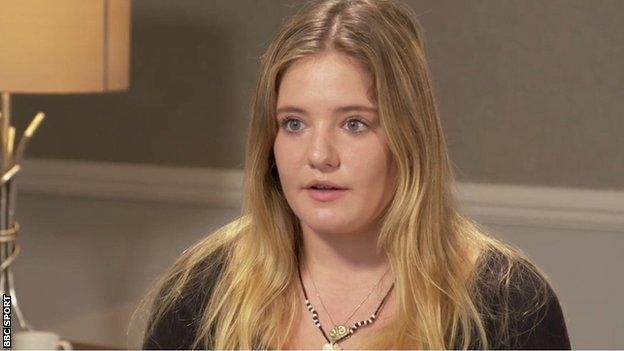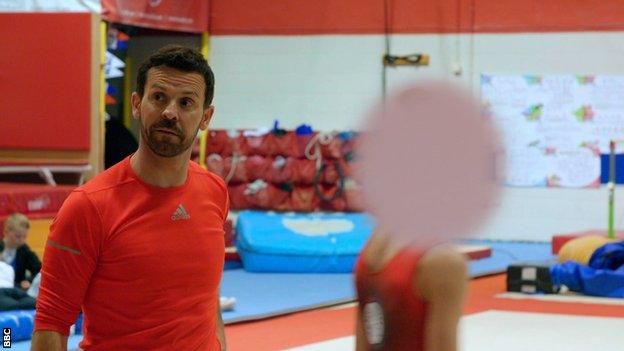Gymnastics abuse: Eloise Jotischky becomes first to win a civil case against British Gymnastics
- Published

Eloise Jotischky says she quit acrobatic gymnastics as a result of her experiences in the sport
WARNING: This article contains distressing details.
A former elite acrobatic gymnast has become the first to win a civil case against British Gymnastics for the abuse she experienced in the sport.
Eloise Jotischky says Andrew Griffiths subjected her to inappropriate weight management techniques and verbal harassment when he was her coach at Heathrow Gymnastics Club.
British Gymnastics has admitted full liability. It has reached a settlement and Jotischky has received a full apology from the governing body's chief executive.
However, after Jotischky had received a letter confirming British Gymnastics' admittance of liability in March, Griffiths went to the World Acrobatic Championships as a Great Britain coach.
British Gymnastics told BBC Sport he has since cancelled his membership with the governing body and is therefore not permitted to coach, while Heathrow said he no longer works for them.
Griffiths previously served a British Gymnastics suspension for inappropriate practices before he coached Jotischky but was allowed back to the sport early after appealing.
BBC Sport contacted him on numerous occasions but he did not respond.
It comes as an independent investigation into allegations of abuse within British gymnastics prepares to deliver its findings.
A number of current and former gymnasts alleged mistreatment at all levels of the sport in 2020.
The Whyte Report, led by Anne Whyte QC and co-commissioned by Sport England and UK Sport, is scheduled to be published imminently.

Andrew Griffiths coached 2010 Britain's Got Talent winners Spelbound
Jotischky, now 19, was at Heathrow between the ages of 10 and 14, training 25 hours a week as an acrobatic gymnast. She competed nationally and internationally but has since quit the sport, she says as a result of her experiences.
She alleges that between 2016 and 2018, she was left "physically exhausted" after being subjected to inappropriate weight management techniques by Griffiths, who put her on a diet of about 800 calories for a non-training day, and about 1,200 calories on a training day. The NHS recommends, external teenage girls should consume between 2,200-2,500 calories per day.
Griffiths, she says, would frequently "weight-shame" and physically prod her, telling her she "looked dreadful".
When she was 12, she weighed 46kg (7st 3lb) but alleges Griffiths decided she needed to lose 5kg (11lb).
"The weighing sessions could be more than once a week," Jotischky told BBC Sport's Natalie Pirks. "It was every Saturday, but sometimes we'd also be weighed during the week as well if they didn't like the way we looked.
"We'd have to line up and step on the scales with everyone else there, and sometimes they'd announce our weight or tell us to step to the side if they weren't happy with our weight so that they could have a conversation with us afterwards."
This would make Jotischky so "incredibly anxious" that towards the end of each week her stress levels would make her feel sick. She would limit her water intake and sit in "boiling hot" baths to try to lose weight quickly.
She alleges Griffiths would also "shout and scream" at her and other gymnasts if he did not approve of their weight.
"We were sitting on the sofa just physically shaking. Having a grown man scream over you, it was terrifying," she said.
"I think being scared from that then contributed to my routine on a Friday night having the hot baths because I was so terrified of what was to come, the consequences of not losing weight."
However, Jotischky says Griffiths' treatment of male gymnasts differed - he would buy fast food for them, which he would tell them to eat in front of the female gymnasts.
In a statement to BBC Sport, British Gymnastics said "there is no place for abuse of any kind in gymnastics", adding it had recently doubled the size of its safeguarding team.
Heathrow Gymnastics Club said: "Andrew Griffiths no longer works for Heathrow Gymnastics Club. The Club has 60 coaches and 1,100 children that participate happily in many gymnastic disciplines."
If you have been affected by issues raised in this article, there is information and support available on BBC Action Line.